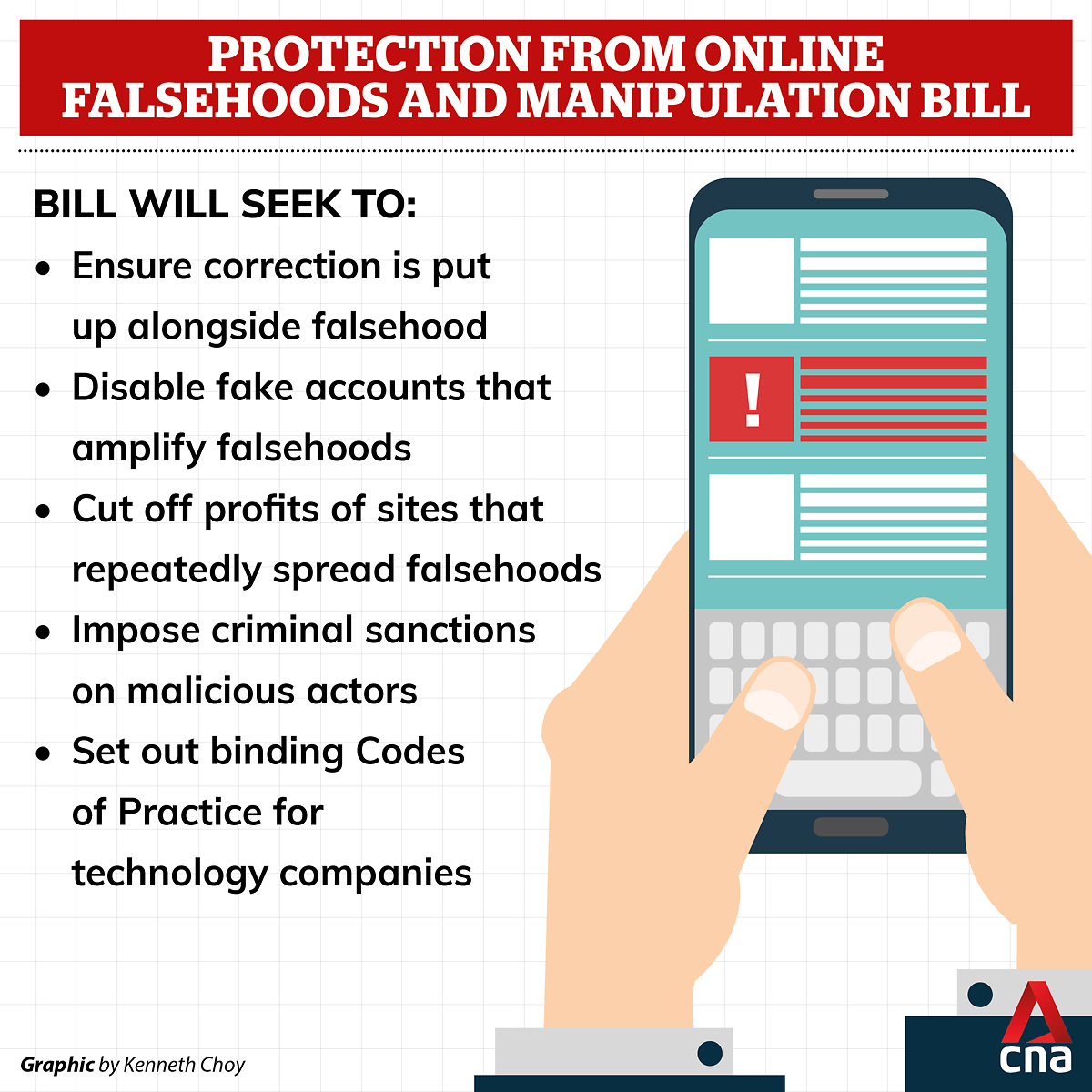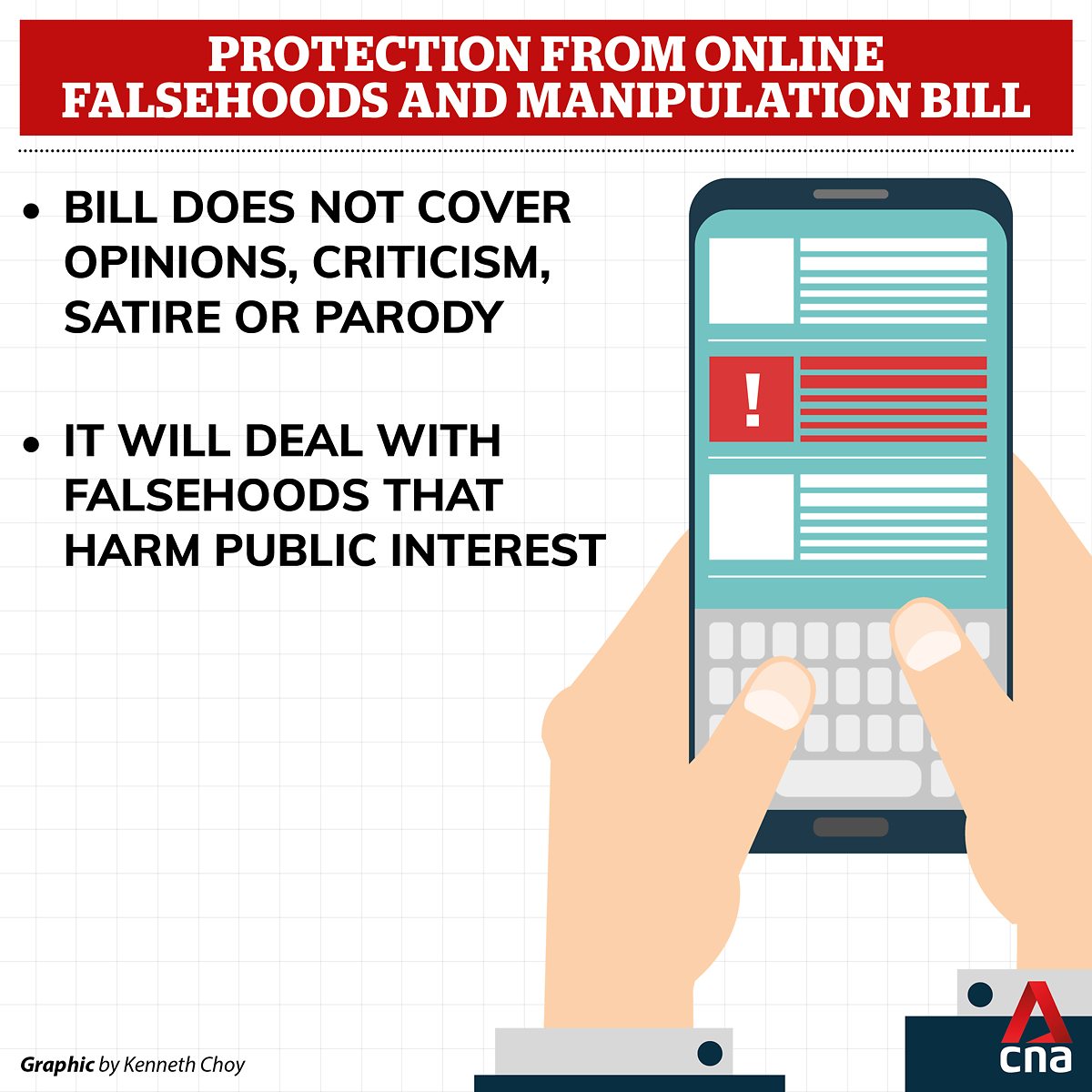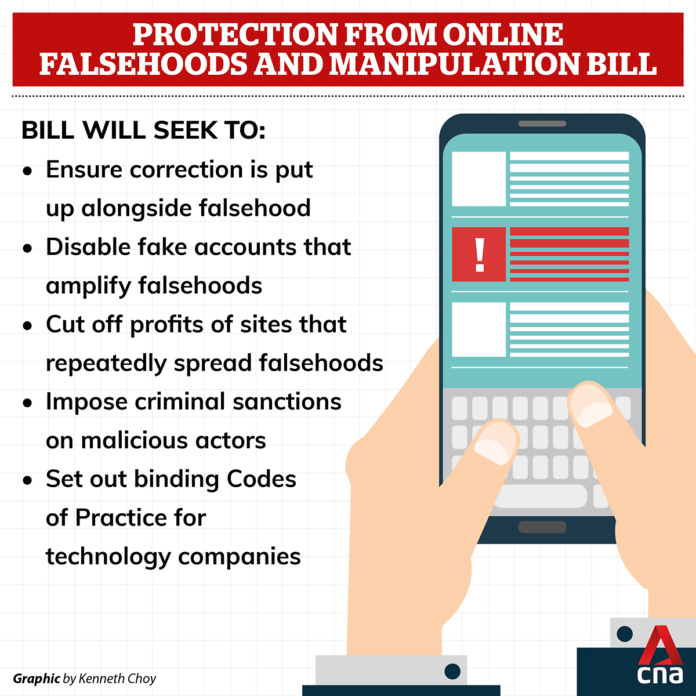SINGAPORE: Singapore is taking another large stride towards being better equipped to deal with the proliferation of fake news and the ilk with the tabling of the Protection from Online Falsehoods and Manipulation Bill in Parliament on Monday (Apr 1).
READ: Select Committee makes 22 recommendations to deal with fake news threat to Singapore
The Law Ministry, in tabling the Bill, said it is intended to protect society from the damage caused by deliberate online falsehoods and fake accounts used to spread such falsehoods. It also intends to protect against malicious actors who knowingly spread harmful falsehoods, or offer disinformation tools and services, using criminal sanctions.
One example of what the law is going after is the false States Times Review article from last November alleging Malaysia had signed several unfair agreements with Singapore in exchange for the assistance of banks here to launder the funds of Malaysian state fund 1MDB.
The false article on its own garnered 1,716 shares, 754 reactions and 157 comments on States Times Review’s Facebook page. However, the message was amplified by seven other Facebook users who shared the article 45 times collectively over three days to 39 unique Facebook groups. This resulted in the article reaching an approximate 800,000 potential viewers.
Deliberate online falsehoods is defined under the new proposed law to be a statement of fact that is false or misleading.
Some examples of statements of fact that are covered, if they are false include:
- “Drunk foreign workers gang-raped a Singaporean girl studying at the HDB void deck late at night”
- “Chinese business association requires members to hire ‘Chinese only’”
- “Government has declared war against Singapore’s neighbours”
The Bill does not target opinion, criticism, satire or parody, the ministry said.
Some examples of opinion, criticism, satire or parody not considered a falsehood include:
- “Singapore’s institutions and policies are often elitist”
- “The ban of events is arbitrary in Singapore”
- “Recent lapses by the Government, such as the HIV data leaks, show a slackening of standards”
The proposed law follows in the footsteps of other countries like France and Germany, which have enacted similar legislation.
The former has the 2018 Law to Combat the Manipulation of Information, which targets the rapid dissemination of fake news through digital tools, while the latter’s 2017 Network Enforcement Act requires social networks to promptly remove illegal content, including falsehoods that are criminal in nature.

WHEN WILL THE LAW BE CALLED ON?
The Law Ministry was clear that in order for any legal action to be taken against an instance of deliberate online falsehood, two criteria must be met: There must be a false statement of fact, and it must be in the public interest.
It defines “public interest” in detail saying that harmful falsehoods manifest in a spectrum of different circumstances and its assessment is very context-specific.
The ministry said a falsehood is of “public interest” if it has consequences on public health or finances or public safety or tranquility. Other consequences which would be deemed in the public interest are when the falsehood is seen to have an influence on the outcome or an election or referendum, incite enmity, hatred or ill-will between different groups or undermine the confidence in public institutions.
Once a minister determines that the two criteria are met, he or she can then instructs a “competent authority” – which Communications and Information S Iswaran said separately on Monday is likely to be within the Info-communications Media Development Authority (IMDA) – to take a range of actions from issuing corrections alongside the falsehood to take-down orders to Internet service providers and social media platforms.
“With these tools, the damage can be countered in ways not possible under existing laws,” the ministry said.
This was flagged by Prime Minister Lee Hsien Loong during his speech at CNA’s 20th anniversary gala dinner on Mar 29. He said the new Bill will give the Government power to hold online news sources and platforms accountable if they proliferate deliberate online falsehoods.
READ: Laws to tackle deliberate online falsehoods to be introduced in Parliament, says PM Lee

WHAT ABOUT REPEAT OFFENDERS?
The new law also aims to hit repeat purveyors of deliberate online falsehoods in an area that hurts: Their pockets. Specifically those keeping their digital ad revenue.
So, if for example Site X, puts out three false statements that each warranted either a correction or take-down order in a period of six months, a declaration regime can be issued against it. The site will not be shut down, or punished with criminal sanctions, but its ability to profit from the published falsehoods will be cut off.
This means if Site X has Google Ads running on its site when the declaration regime is issued, the digital ad operator must shut off ads in Singapore so the site will not receive digital ad revenue from Singapore.
Additionally, the owner or operator of Site X must stop receiving any financial benefit from operating the site and post a notice on the site informing viewers of the declaration. People will also be prohibited from offering financial assistance to the site.
Now-defunct sociopolitical site The Real Singapore is an example of an online entity that published online falsehoods for financial gains. During the lawsuit against the site’s owner Yang Kaiheng and his wife Ai Takagi, it was discovered that the couple had netted more than half a million in ad revenue in less than three years, allowing them to pay off their A$190,000 (S$191,768) 30-year home loan in just 11 months.
JAIL TIME BECKONS FOR CYBER HIRED GUNS
There are also criminal sanctions included in proposed legislation, as the Government looks to wield a bigger stick against malicious actors who make use of digital tools for misinformation campaigns that have national security implications.
READ: Select Committee – Tech giants need to be more accountable; new laws possible
Specifically, there are criminal sanctions on three types of actors
- Those who knowingly communicate a falsehood, via digital means, knowing or having reason to believe that it will or is likely to prejudice specified grounds of public interest
- Those who make a bot for the purpose of spreading a falsehood in Singapore
- Those who, for reward, provide services for the purpose of spreading a falsehood in Singapore
For the first offence, if a person is found guilty, the punishment is a fine of up to S$50,000 or jail of up to 5 years, or both. For any other case, the fine is up to S$500,000, according to the Bill.
The punishments go up to S$100,000 fine, jail time of up to 10 years, or both, for the person and up to S$1 million in fines for the entity if a bot or inauthentic online account is used to spread the falsehood.
The punishment for the second and third type of actors are the same; if a person is convicted, he or she faces up to S$30,000 in fine, up to 3 years in jail, or both. For any other case, a fine of up to S$500,000. These penalties could be doubled if the falsehood will or is likely to impact public interest as defined in the law.
The Protection from Online Falsehoods and Manipulation Act takes into account some of the 22 recommendations made by the Select Committee looking into deliberate online falsehoods last September.
“Our citizens and civic society are key to upholding the quality of information in our public life, discussions and debate,” the Law Ministry said.
“The Government is supporting this whole-of-society effort, including by strengthening public education and awareness.”





